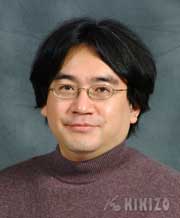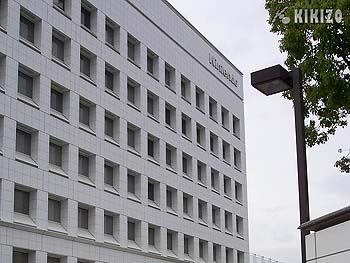Official: "Nintendo DS" Announced
Nintendo has finally ended the speculation by announcing exactly what its new mystery product is - a dual-screen device in the palms of both hands, launching late 2004.
Last night, charismatic Nintendo leader Satoru Iwata revealed the mystery product he hopes will change Nintendo's fortunes, after months of vague information drip-fed to the Japanese press. It's a portable, dual-screen, dual-processor device that runs games not on cartridge or disc media, but on semiconductor memory of up to 1 Gigabit. It's provisionally called Nintendo DS, standing for Dual-Screen, and will be revealed in playable form at this year's E3 in May.
The unprecedented announcement reveals a product that will exist completely independently of GameCube and GameBoy Advance - a "third pillar" as Iwata recently described it - and is expected to ship before the end of this year.
Some confusion concerning current official information is already in evidence however; on the one hand it was said that the system will be held by the user with one screen in each hand, while other sources have today claimed that the two screens will be vertically aligned, one on top of the other. We think both play scenarios are likely.
Nintendo said that gamers should look forward to being able to manage their game progress from two different perspectives, "enhancing both the speed and strategy of the challenge". For example in a football game, you can view the whole game on one screen, while simultaneously focusing on an individual footballer's tackle or goal on the other screen.
There is also an emphasis on the benefit in switching perspectives during gameplay in Nintendo's announcement: "Players will no longer be forced to interrupt game play to shift perspective, such as moving from a wide shot to a close up, or alternating between a character's ongoing battle and a map of their environment. Nintendo DS makes it possible to perform the tasks in real time by simply glancing from one screen to the other."
 |
| Iwata: "We have developed Nintendo DS based upon a completely different concept from existing game devices." |
Nintendo DS features two separate 3" TFT LCD display panels, separate processors, and semiconductor memory of up to 1 Gigabit. In addition to Nintendo developed software, the company is in discussions with third party game developers around the world.
Nintendo DS will be marketed separately from the existing Nintendo Game Boy Advance portable system and Nintendo GameCube home console, and its presence at E3 will reflect that in no uncertain terms, the company said today.
Nothing else is known about the machine at present, and there are certainly no suggestions regarding what software we might see in Los Angeles in May. But that has not stopped a tidal wave of reaction from the industry.
Comparisons to PSP are inevitable, with one source claiming, "the announcement is in direct response to the PSP announcement last year". PSP is expected to cost around the $270 mark at retail, and it would be hard to see Nintendo DS costing significantly less - perhaps $50 under - in return for a product that is unlikely to offer the attractive media capabilities of PSP.
So which audience is Nintendo DS aimed at exactly? The core Nintendo fans, for sure. And if Nintendo was prepared to say anything more about the announcement today, it would probably cite "gamers" as the second audience, on the usual "Nintendo is just for gamers" tip.
The announcement seems to have been timed with Nintendo's upcoming financial report, and would have been difficult to keep secret much longer with the development community becoming increasingly aware about the hardware.
But industry watchers have warned that Nintendo might be spreading itself too thinly across the its three platforms (and four if you include China's iQue, with which the Nintendo DS is more than likely to share some similarities) - not to mention the overhead in manufacturing the different products, sales of which are, at present, strictly reactive to price drops.
Thirdparty support will be a major factor in the machine's success, but perhaps most importantly in terms of Nintendo's untouched reputation as a games maker, it will need to prove the dual screen concept with some absolutely stunning, innovative software.
Some are heralding this as Nintendo's biggest mistake ever, a product that will be mentioned in the same breath as Virtual Boy. But some - and unsurprisingly a lot of Nintendo's supporters - are keeping the faith in what Nintendo does best. After all, if the games are as revolutionary as the hardware it will still be respected - even it if plummets with Iwata-san to its doom.
If it does fail, the company is in deep trouble. We'll bring you everything on Nintendo DS as it breaks, with full coverage from E3 later this year.
Director, Kikizo.com





 Satoru Iwata Video Interview - the late Nintendo president spoke with Kikizo in 2004 as 'Nintendo Revolution' loomed.
Satoru Iwata Video Interview - the late Nintendo president spoke with Kikizo in 2004 as 'Nintendo Revolution' loomed. Kaz Hirai Video Interview - the first of Kikizo's interviews with the man who went on to become global head of Sony.
Kaz Hirai Video Interview - the first of Kikizo's interviews with the man who went on to become global head of Sony. Ed Fries Video Interview - one of Xbox's founders discusses an epic journey from Excel to Xbox.
Ed Fries Video Interview - one of Xbox's founders discusses an epic journey from Excel to Xbox. Yu Suzuki, the Kikizo Interview - we spend time with one of gaming's most revered creators.
Yu Suzuki, the Kikizo Interview - we spend time with one of gaming's most revered creators. Tetris - The Making of an Icon: Alexey Pajitnov and Henk Rogers reveal the fascinating story behind Tetris
Tetris - The Making of an Icon: Alexey Pajitnov and Henk Rogers reveal the fascinating story behind Tetris Rare founders, Chris and Tim Stamper - their only interview? Genuinely 'rare' sit down with founders of the legendary studio.
Rare founders, Chris and Tim Stamper - their only interview? Genuinely 'rare' sit down with founders of the legendary studio. The History of First-Person Shooters - a retrospective, from Maze War to Modern Warfare
The History of First-Person Shooters - a retrospective, from Maze War to Modern Warfare